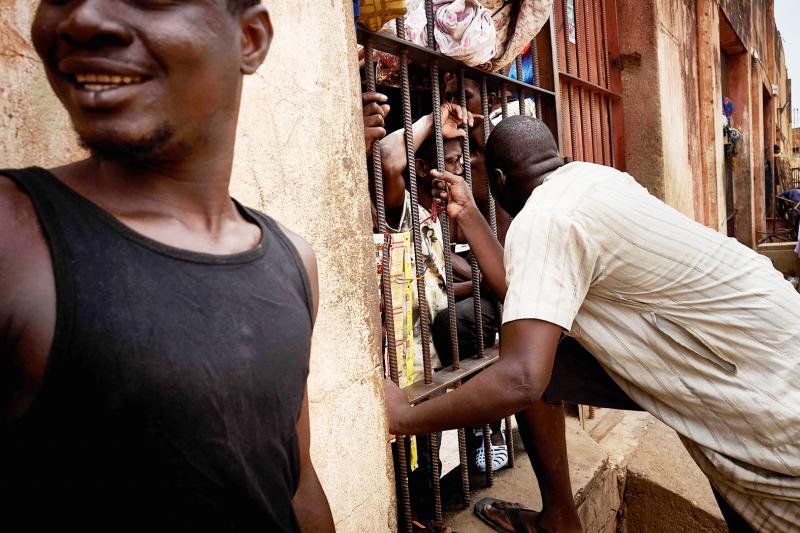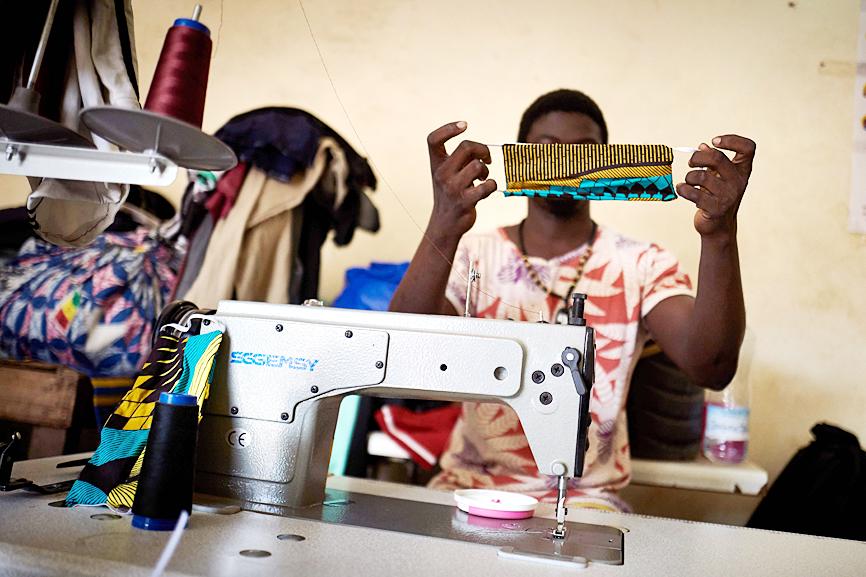Mali’s largest jail is a squalid and overcrowded colonial-era throwback that, in theory, would be an open invitation to COVID-19, except that the staff at Bamako Central Prison say that so far they have kept the virus at bay, thanks to hygiene and self-help.
Outside the penitentiary’s walls, the Malian capital has registered most of the country’s 2,577 infections and 125 deaths, while inside, the number of recorded cases is exactly zero.
“From the start of the pandemic, we did everything we could to prevent it from getting in,” said prison warden Adama Guindo, who wore a mask.

Photo: AFP
Hand cleanliness, temperature checks for visitors and an innovative scheme for inmates to make masks have been crucial.
There is every reason to be vigilant, as the prison is an ideal breeding ground for the coronavirus.
Built by French colonial authorities in 1951, the prison was designed for 400 inmates, but holds 2,100. Hundreds of people are crammed on top of each other in filthy cells.

Photo: AFP
Common criminals and captured militants from Mali’s eight-year conflict live cheek by jowl: cooking together, running tattoo parlors and trading cigarettes.
In Mali’s Bamako Central Prison, officers transferred about 600 inmates to another jail in the city’s suburbs to reduce overcrowding. Some prisoners also received a presidential pardon.
However, even with those measures, the prison remains hugely overcrowded, mostly because of the vast number of people held in pretrial detention.
Only 160 inmates there have been convicted, which Guindo admitted is a “catastrophe.”
His staff have limited prison visits in a bid to reduce the chances of infection. Anyone entering must also take a temperature test and wash their hands.
However, early action by the authorities to impose restrictions on contact and mobility has been a key part of reducing the risk, experts have said.
One of the first steps was an offer of help by the International Committee of the Red Cross (ICRC).
It donated hand-washing kits, which are dotted around the prison, and is also encouraging prisoners to manufacture their own face masks.
The ICRC buys 500 masks per week from inmates who work as tailors and then redistributes them.
Chiaka, a prisoner and apprentice seamster who is about 20 years old, said that usually the prison tailors made everyday clothing.
“Now masks have become a priority,” he said.
For all that, only prison officers appear to wear masks. Many in Mali choose not to, partly because of stigma, although, among prisoners, the main reason seems to be an indifference to the coronavirus.
The ICRC confirmed that there have been no documented cases at the prison and Mahamadou Diarra, one of the jail’s two doctors, said that there had “only been suspected cases” of coronavirus, all of which had tested negative.
Guindo is cautiously beginning to hope that the pandemic will pass his prison by.
“If the monitoring continues to be done proactively, we have every chance of being spared,” he said. “We’re in the middle of the river, but we can’t declare victory until we’ve reached the other side.”

Indonesia was to sign an agreement to repatriate two British nationals, including a grandmother languishing on death row for drug-related crimes, an Indonesian government source said yesterday. “The practical arrangement will be signed today. The transfer will be done immediately after the technical side of the transfer is agreed,” the source said, identifying Lindsay Sandiford and 35-year-old Shahab Shahabadi as the people being transferred. Sandiford, a grandmother, was sentenced to death on the island of Bali in 2013 after she was convicted of trafficking drugs. Customs officers found cocaine worth an estimated US$2.14 million hidden in a false bottom in Sandiford’s suitcase when

CAUSE UNKNOWN: Weather and runway conditions were suitable for flight operations at the time of the accident, and no distress signal was sent, authorities said A cargo aircraft skidded off the runway into the sea at Hong Kong International Airport early yesterday, killing two ground crew in a patrol car, in one of the worst accidents in the airport’s 27-year history. The incident occurred at about 3:50am, when the plane is suspected to have lost control upon landing, veering off the runway and crashing through a fence, the Airport Authority Hong Kong said. The jet hit a security patrol car on the perimeter road outside the runway zone, which then fell into the water, it said in a statement. The four crew members on the plane, which

Japan’s ruling Liberal Democratic Party (LDP) and its junior partner yesterday signed a coalition deal, paving the way for Sanae Takaichi to become the nation’s first female prime minister. The 11th-hour agreement with the Japan Innovation Party (JIP) came just a day before the lower house was due to vote on Takaichi’s appointment as the fifth prime minister in as many years. If she wins, she will take office the same day. “I’m very much looking forward to working with you on efforts to make Japan’s economy stronger, and to reshape Japan as a country that can be responsible for future generations,”

SEVEN-MINUTE HEIST: The masked thieves stole nine pieces of 19th-century jewelry, including a crown, which they dropped and damaged as they made their escape The hunt was on yesterday for the band of thieves who stole eight priceless royal pieces of jewelry from the Louvre Museum in the heart of Paris in broad daylight. Officials said a team of 60 investigators was working on the theory that the raid was planned and executed by an organized crime group. The heist reignited a row over a lack of security in France’s museums, with French Minister of Justice yesterday admitting to security flaws in protecting the Louvre. “What is certain is that we have failed, since people were able to park a furniture hoist in the middle of